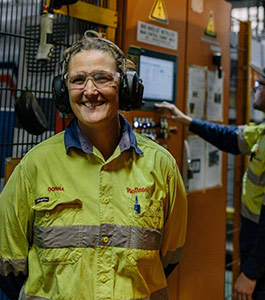Research shows that a diverse and inclusive workforce produces benefits such as increased productivity, profitability and competitiveness within an organisation. Developing a diverse and inclusive workforce not only creates organisational success, but also leads to the prevention of mental injuries and improvement of mental health and wellbeing for workers.
Globally, COVID-19 has made it incredibly difficult for workers to navigate through a range of mental health issues (such as anxiety, stress and depression), evidenced in an increased demand for employee assistance programs. The detrimental impacts of such stressors can be minimised through fostering an organisational environment which values and supports the unique diversity of all staff, leading to a sense of safety and belonging while at work. By promoting diversity and inclusion, workplaces strengthen team morale and facilitate a culture where people are supported to discuss health and safety issues in relation to both physical and mental safety. Such a culture is essential for affording an environment where employees feel as though they are encouraged to reach their full potential, which in turn has a positive impact on their mental health and wellbeing. The support they feel at work bolsters their resilience and better equips them to deal with challenges in both their professional and personal lives. A study by the APM evidenced that diverse and inclusive workplaces produce many benefits for employees, including improved conflict resolution and problem-solving skills, increased empathy and understanding of customer needs, and a higher willingness to discuss and manage mental health issues. This consequently leads to more productive and engaged employees, greater retention and loyalty to the organisation and a larger, more diverse candidate pool for recruitment.
Mental health, diversity and inclusion are interrelated in that employees from diverse backgrounds can be victims of unconscious bias, microaggressions and a lack of representation in the workplace. They are also more likely to be the victims of discrimination, prejudice, and exclusion. A study by the Diversity Council Australia found that employees from culturally diverse backgrounds are up to three times less likely to view their workplaces as being inclusive. Such factors can lead to poor mental health resulting in an increased likelihood of anxiety, depression and self-harm. Thus, strategies which fortify diversity and inclusivity in the workplace will also support mental health. Given that people are an organisation’s most valuable asset, ensuring that the workforce feels satisfied, engaged and valued is beneficial for all parties involved.
References
https://www.headsup.org.au/training-and-resources/news/2017/09/15/building-inclusiveworkplaces-for-a-diverse-workforce
https://apm.net.au/employers/health/how-diversity-and-inclusion-support-a-healthy-worka29f0441
https://cultureplusconsulting.com/2018/08/17/how-does-employee-well-being-link-to-diversityand- inclusion/
https://www.forbes.com/sites/onemind/2020/07/14/the-essential-role-of-mental-health-for-adiverse-
inclusive-workplace/?sh=37d88e4dac4d





